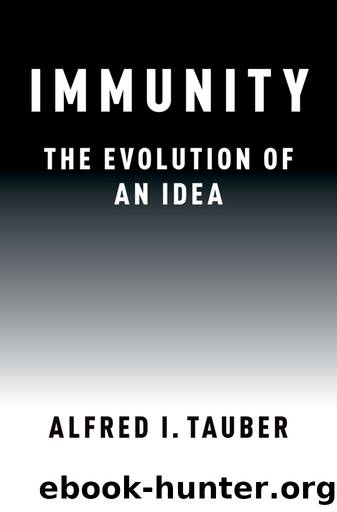Immunity: The Evolution of an Idea by Alfred I . Tauber

Author:Alfred I . Tauber
Language: eng
Format: epub
Publisher: Oxford University Press
Published: 2016-11-15T00:00:00+00:00
CONCLUSION
When immunity is regarded under the common banner of cognitive function, this formulation represents the fundamental question to which current immunology repeatedly returns. Because all schools of immunological research implicitly accept the precept that the immune system requires a theory of regulation to account for cognition, the common consensus has been broken by a different kind of division, one I have presented using philosophical debates concerning how meaning is generated in language. If immunologists are using a cognitive paradigm, then they should better understand the various models of cognition developed in the disciplines already concerned with its definition. After all, the very application of âcognitiveâ models to immunology has a history and carries various theories of explanation, which may demonstrate its artificiality rather than its true applicability for deciphering immune function. However, if we are to accept that immunology today operates with this human-derived metaphor of mental functions, then we may finally explicate its protean uses as metaphor.
To unpack this issue, I have considered two competing understandings of perceptionâone based on a notion of autonomous selfhood with its attendant representational mode of cognition and a second formulation in which representation, a second-order process, has been replaced with presentation. In this latter view, cognition and the underlying notions of agency that support such a construction are acknowledged as products of the third-person point of view. So, whether adopting the programs advocated by Gibson or Maturana, deconstruction of selfhood follows.
If immune selfhood reflects an underlying conception of a homunculus discerning itself from the other through a cognitive faculty, then the same issues confronting current representational philosophies of mind lie latent in contemporary immune theory. Discerning those issues raises a new dimension in the critique of the immune self. Simply, with the invocation of agency, the weakness of the âCartesian theaterâ in the immune setting is apparent: The immune system does not reflect; it perceives without the interposition of an agent reviewing its findings. The scientist observes and constructs the self and its cognition and thereby applies distinctive Cartesian epistemological characteristics. Simply, a sympathetic fallacy is committed when the immune system becomes an immune self. In this light, the cognitive models applied to immune function illustrate competing theoretical orientations and illuminate the deep philosophical infrastructure that guides them.
Immunology has been swept into these controversies, willy-nilly, because of its deep commitment to the cognitive character of immune functions. Although an agency-based model has dominated immune theorizing, recent research supports the utility of an âecologicalâ orientation, which reflects the growing interest in systems biology, in which the organism becomes a ânodeâ in an ecological network. This approach explores integration of functions (e.g., development, metabolism, and immunity) and thereby emphasizes interconnections, regulative dynamics, and organizational structures of holistic constructs, where individuals become subsumed to ecological and symbiotic relationships of various kinds.
The controversies swirling around the prevailing cognitivist paradigm reach deeply into the conceptual issues at the foundations of philosophy of mind. And immunology, because of its adoption of the cognitivist formulation to describe immunity, is drawn into those discussions.
Download
This site does not store any files on its server. We only index and link to content provided by other sites. Please contact the content providers to delete copyright contents if any and email us, we'll remove relevant links or contents immediately.
| Administration & Medicine Economics | Allied Health Professions |
| Basic Sciences | Dentistry |
| History | Medical Informatics |
| Medicine | Nursing |
| Pharmacology | Psychology |
| Research | Veterinary Medicine |
A History of the Human Brain by Bret Stetka(498)
The Spike by Mark Humphries;(470)
Basic Exercise Physiology by Moran S. Saghiv & Michael S. Sagiv(466)
The Plague Cycle by Charles Kenny(449)
The Whole-Body Microbiome by Brett Finlay & Jessica Finlay(427)
Virus Mania by Torsten Engelbrecht; Köhnlein Claus(403)
Reviews of Physiology, Biochemistry and Pharmacology by Unknown(387)
The Genetic Lottery by Kathryn Paige Harden(383)
Lymph & Longevity by Gerald Lemole(352)
Your Brain on Exercise by Gary L. Wenk(349)
Biophysics of Membrane Proteins by Unknown(332)
Soft-Wired: How the New Science of Brain Plasticity Can Change Your Life by Dr. Michael Merzenich Phd(302)
Fixing My Gaze by Susan R. Barry; Oliver Sacks(293)
Anatomy of the human body: Anatomy body part by Anik Ahmed(292)
Corona, False Alarm?: Facts and Figures by Karina Reiss && Sucharit Bhakdi(287)
Netter's Clinical Anatomy E-Book by John T. Hansen(283)
Structural Immunology by Unknown(260)
Essentials of Pathophysiology by Tommie L. Norris(249)
Brain Weaver, Volume 1 by Andrew Newberg(229)
